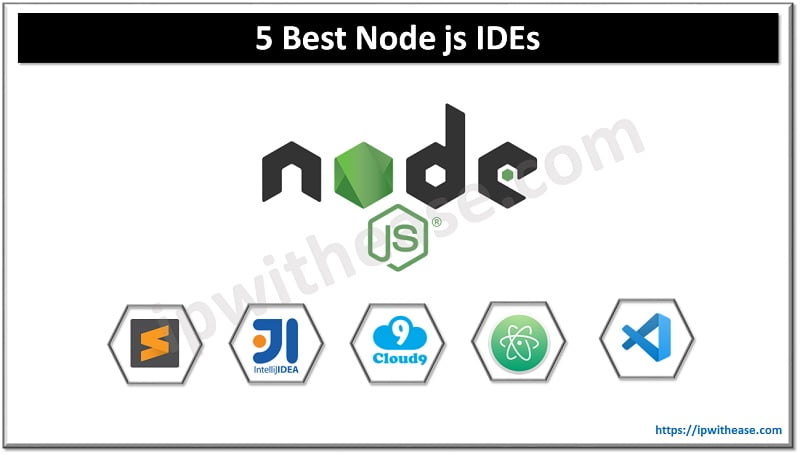NodeJS IDEs are becoming increasingly popular among developers as they come in very handy while developing lightweight applications. A wide range of IDEs are available in the market with their unique features but what they all have in common is that they help developers easily manage asynchronous and side-by-side development functions.
It is extremely important to control the script by editing and debugging it in a development process. That is why businesses need to hire NodeJS developers in India so that they can make the most out of the best NodeJS IDEs available in the market. Apart from coding, these tools are proven to be useful to developers in compiling and deploying software code.
It might pique your interest to know that these IDEs can also run on many other programming languages. But they certainly have one in common, i.e. Javascript. And now, it’s time to discuss the matter for which you came here.

Best IDEs for NodeJS app development
Atom
Atom is a text editor built on Electron and distributed as free and open-source software under the MIT license. It aims to provide a user experience similar to Sublime Text and Visual Studio Code, with the flexibility of Vim.
The Atom text editor is open-source software developed by the non-profit organization, The Apache Software Foundation (ASF). It was created by Evan Zodetich in November 2011 and released as Alpha 1 on 29 June 2012.
Atom’s primary features are its extensibility through packages (called “snippets”) and its integration with GitHub, which also supports Git source control management.
It’s not just a text editor, though: Atom has several plugins that allow it to be extended in all sorts of interesting ways. These include things like a built-in debugger, support for syntax highlighting and code folding, live previewing of HTML, CSS, and JavaScript files, documentation support, developer tools (such as minify/uglify), and much more.
Atom’s strengths lie in its ease of use and powerful extensions, but it lacks some things users may want or expect from a text editor — like a Git integration or the ability to run arbitrary commands on files within Atom itself.
Sublime Text
Sublime Text is a cross-platform, full-featured text editor for code, markup, and prose. It is available for OS X, Windows, and Linux and can be used alongside your favorite IDE (Integrated Development Environment).
Sublime Text has a clean interface that makes it easy to navigate through the file structure. In addition to the syntax highlighting capabilities of IDEs, it supports on-the-fly syntax checking using the built-in SublimeLinter system. This means you will never have to go looking for a linter tool again.
If you’re looking for an editor that’s easy to use but also powerful enough then Sublime Text is the perfect pick for you. The advantages it offers are as mentioned below:
- It’s a real programming environment. This means you can write code in your text editor, and then run it in the browser as well.
- It’s open source. This means that you can see exactly what is happening under the hood, which is helpful if you’re debugging something that isn’t working right.
- It’s fast. There are some other editors out there with similar features, but Sublime Text is the most popular and most popularly used one by far.
- It’s easy to learn and use. You just have to download it and start using it!
Cloud 9 IDE
Cloud 9 IDE is the most popular IDE for Node.js development. It is a cross-platform, open-source, and cross-browser code editor with support for many programming languages and has been around since 2011.
Cloud 9 IDE is designed to work on all major operating systems including Mac OS X, Windows, Linux, Android, and iOS. Apart from that, this tool can function perfectly in Google’s operating system for Chromebooks, i.e. Chrome OS.
The Cloud 9 IDE comes with a large collection of plugins that you can use to create web applications using Node.js or other languages like Python or Java. It also includes support for many languages including Java, PHP, and more in the future.
The latest version of Cloud 9 IDE offers support for the latest features of JavaScript ES6 (ECMAScript 6) which means you can use arrow functions and classes instead of using traditional function syntaxes like var f = () => {}; when it comes to NodeJS, you can also use promises in your code instead of using callbacks like some other IDEs like Webstorm.
IntelliJ IDEA
IntelliJ IDEA has all the features you would expect in an IDE, such as a debugger and code completion, but it also offers some unique features that make it stand out from other IDEs.
IntelliJ IDEA has a rich set of features that make it easy to get started on your project, including:
- A modern user interface with a unified toolset and all the features you expect from modern IDEs
- Powerful code completion support
- Integrated remote debugger support
- Support for JavaScript debugging in Chrome browser (beta)
IntelliJ IDEA is available on Windows, Mac OS X, and Linux platforms. It comes with support for many popular programming languages and frameworks, including Java (including Android development), JVM languages (such as Scala), Groovy, Kotlin, and Spring Boot.
The IDE provides built-in support for Android Studio and Eclipse plugins that allow you to use IntelliJ as your default editor when using those environments. It can also be used to develop web applications using AngularJS or EmberJS without needing to switch between different IDEs.
IntelliJ IDEA has an active community and provides many useful features, like code completion, refactoring, code analysis, and unit testing.
Visual Studio Code
The last candidate on the list is Visual Studio Code. It is both an open-source IDE and a cross-platform text editor for Linux, macOS X, and Windows. It is developed by Microsoft and currently runs on the Electron platform, but also works in Chrome via a plugin. It’s not limited to just node.js development, but it can be used to develop almost any web application or system program.
Visual Studio Code provides many features commonly found in IDEs like autocomplete, syntax highlighting, code snippets, etc. It also has an excellent integrated terminal with support for tmux and screen, making it ideal for debugging applications written in Javascript or Node.
The IDE itself is highly configurable and extensible via plugins. There are many available for Node.js development, including:
- npm-installer (install npm packages)
- npm-checkout (check out a package from npmjs.com)
- eslint (lint your code against an ESLint configuration file)
- babel-plugin-react (compile ES6/ES7 code with Babel)
Visual Studio Code has built-in support for debugging, testing, linting, and publishing your code as well as Git integration so you can manage your files in the cloud or on your local machine.
Final words
All the NodeJS IDEs including the ones we discussed here are code editors. They help increase the work efficiency of the programmers by rendering a suitable development environment. This will not only help you save time and effort but it will also allow you to build apps with rich features and clean codes.
Now, what are you waiting for? Tell me which one of these IDEs we discussed you like. If you know about or have experience with more NodeJS IDEs, please suggest them in the comments section below.
Continue Reading:
Complete Guide to Node.js Framework
What Is the Best Programming Language for Web Scraping?



